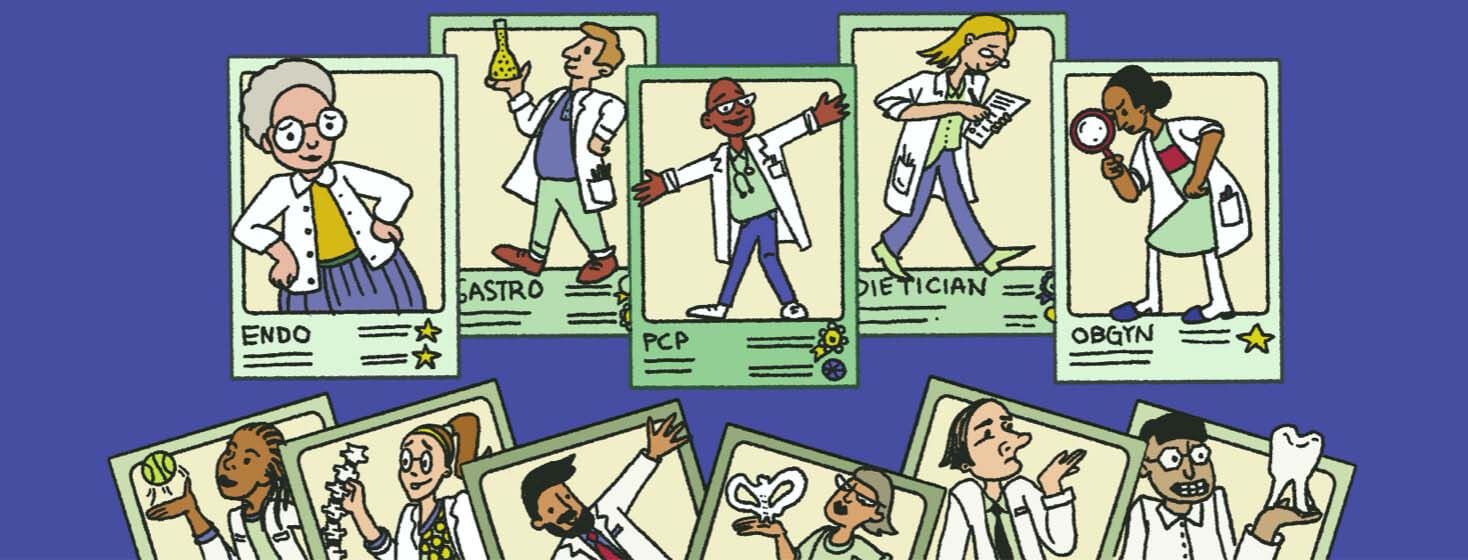All the Health Professionals Who Treat My Endometriosis Symptoms
Doctors usually lump endometriosis in with other reproductive disorders. But endo is an inflammatory condition affecting much more than my pelvis. That's why I take a multidisciplinary approach to my health care.
There's no single provider who can solve all my problems. Most members of my medical team don't talk to each other. But a growing number of scientists think health professionals need to offer a more comprehensive approach to endo.
I couldn't agree more.
Endometriosis as a whole-body disease
I already know that lesions and scar tissue can cause many problems. But according to a team of researchers at Yale Medicine, we need to think about how endo affects the body on more of a cellular level. Considering all of my symptoms, that certainly makes sense to me.
In addition to chronic pelvic pain, infertility, and painful sex, the Yale study recently published in The Lancet found evidence that endo can:1
- Cause inflammation throughout the body
- Affect the metabolism of liver and fat tissue
- Change how the genes inside your brain work, which can increase sensitivity to pain and boost the odds of depression and anxiety
I think it’s great that some researchers are diving deeper into the effects of endometriosis. It gives me hope that there will be a systemic treatment or a cure. But for now, I have to manage my symptoms separately.
Frequently asked questions about my medical care
How many different types of doctors have you seen?
My endo symptoms started getting worse in my mid-30s. Terrible period pain and uncomfortable sex weren't my only problems.
I developed allergies for the first time in my life. My digestion issues with high-FODMAP foods became unmanageable. Then came the pre-period eczema outbreaks.
My health issues seemed like a game of whack-a-mole. I'd get one issue under control, and something else would pop up. I knew everything was connected, but that's not how my medical team approached things.
Over the past five years, I've seen a surprising number of health professionals for someone who hardly gets sick. The list of 18 different types of providers includes:
- Primary doctor
- OB-GYN
- Endometriosis specialist
- Gastroenterologist
- Clinical dietitian
- Dermatologist
- Allergist
- Urogynecologist
There's also the:
- Sports medicine doctor
- General physical therapist
- Pelvic floor physical therapist
- Spinal physical therapist
- Sports medicine physical therapist
- Chiropractor
Let's not forget the doctors I see for side issues caused by living with a chronic inflammatory disease:
- Dentist (to repair issues from teeth grinding)
- ENT (for nasal surgery due to allergies and other breathing problems)
- Ophthalmologist (for vision trouble that gets worse with my period)
- Psychologist (to manage the stress of life with a chronic health condition)
- Behavioral therapy counselor (for chronic depression and PMDD)
Which doctors have helped the most?
That’s a tough question. Each helped according to their area of expertise.
My primary doc has helped me with lots of general issues like migraine attacks and period pain. But I wouldn't be where I am today without help from my endometriosis specialist, GI doctor and dietitian, behavioral counselors, and physical therapists.
The urogynecologist also gets a shoutout. He didn’t give me special treatment, but he referred me to a spinal physical therapist for visceral manipulation. She helped me with some of my bladder pain, and now I don’t feel like I have to pee all the time.
The ENT (ear, nose, and throat) doctor also changed my life. The inside of both my nostrils were practically swollen shut because of enlarged tissue caused by allergies. He also removed scar tissue and fixed a structural problem. (Look up turbinate reduction and butterfly graft if you want to know more about what I had done.)
Somewhat surprisingly, the OB-GYN was the least helpful. She pushed hormonal suppression, birth control, and a hysterectomy as my only treatment options.
I said no to all three and asked for more detailed imaging or exploratory surgery. She refused both.
I never returned to that OB-GYN after she labeled me "difficult" and dismissed some of my symptoms as unrelated to endo. She also told me I should be grateful I didn't feel worse. Thankfully, my excision surgeon disagreed.
What doctors do you see now?
My primary doctor is my go-to for pain management, migraine meds, and antidepressants. I see her for all of my ongoing issues, including those related to endo. She's also a great help when I need referrals to other specialists.
I'll visit one of my physical therapists every now and then. At the moment, I'm seeing a sports medicine person for PT. She's helping me with some hip and leg issues that get worse with weight-lifting and other kinds of exercise.
There’s a chance I’ll see a neurologist and an endocrinologist. But I’m too worn out from multiple surgeries, office visits (and dealing with health insurance) to take on a new doctor-patient relationship right now.
Maybe I’ll change my mind sometime in 2023.

Join the conversation